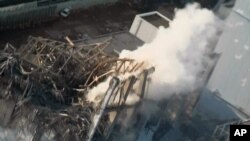United Nations nuclear experts said Tuesday that Japan's decision to elevate its nuclear power accident to the highest level does not mean conditions have worsened or that Japanese authorities had earlier downplayed the seriousness of the disaster.
Japan Tuesday designated the accident as a level seven - the highest stage on the nuclear incident scale formulated by the U.N.'s International Atomic Energy Agency. That puts the crisis on the same level as the 1986 disaster at Chernobyl, in Ukraine.
Japanese Prime Minister Naoto Kan says the situation is stabilizing at the Fukushima nuclear power plant, which was crippled after a massive earthquake and tsunami on March 11.
Denis Flory, the IAEA's head of nuclear safety and security, says Japanese data show that the Fukushima plant has released about 10 percent of the radioactive material that the Chernobyl plant did.
He also said Tuesday that tests of vegetables, fruit, meat, seafood, and milk produced in eight prefectures around Fukushima found either no radioactive material or found small levels that are considered to be safe.
Japan raised the crisis from a five to a seven on the international scale, indicating a major accident with widespread health and environmental effects. Chief Cabinet Secretary Yukio Edano says that, unlike the Chernobyl calamity, there has so far been no "direct health hazard" from the Fukushima accident. The Chernobyl disaster is believed to have killed about two dozen people within days and thousands more over the ensuing years.
Safety agency officials also noted that, in Chernobyl, radiation spread over a wide area when a reactor exploded. So far at Fukushima, most of the radiation has been contained within large concrete chambers, though those chambers may be leaking.
Despite those assurances, China on Tuesday again voiced concern over Japan's move to discharge nuclear wastewater from Fukushima's crippled reactors into the Pacific. China's official Xinhua news agency says Chinese Premier Wen Jiabao talked Tuesday by telephone with Japanese Prime Minister Kan, and demanded that the Japanese government "pay high attention" to the impact that such discharges have on the marine environment.
The report said Mr. Wen also urged the Japanese leader to adhere to related international law, and to "promptly and accurately" inform China of new developments.
Prime Minister Kan used his news conference to stress that the levels of radiation leaking from the plant are now decreasing and that the situation is moving "one step at a time" toward stability.
He also said it is time for the country to turn to the task of reconstruction and said the Japanese people must regain the determination shown in rebuilding the country after World War II. He said Japan should not just restore things as they were, but use the twin disasters to build a better future.
Mr. Kan additionally urged citizens to abandon the consumer restraint shown out of respect for the victims of the earthquake and tsunami, which has left about 28,000 people dead or missing. He said they should instead help survivors by buying goods from the areas most affected by the disasters.
Japan PM Says Nuclear Plant Stabilizing Despite Higher Crisis Rating




